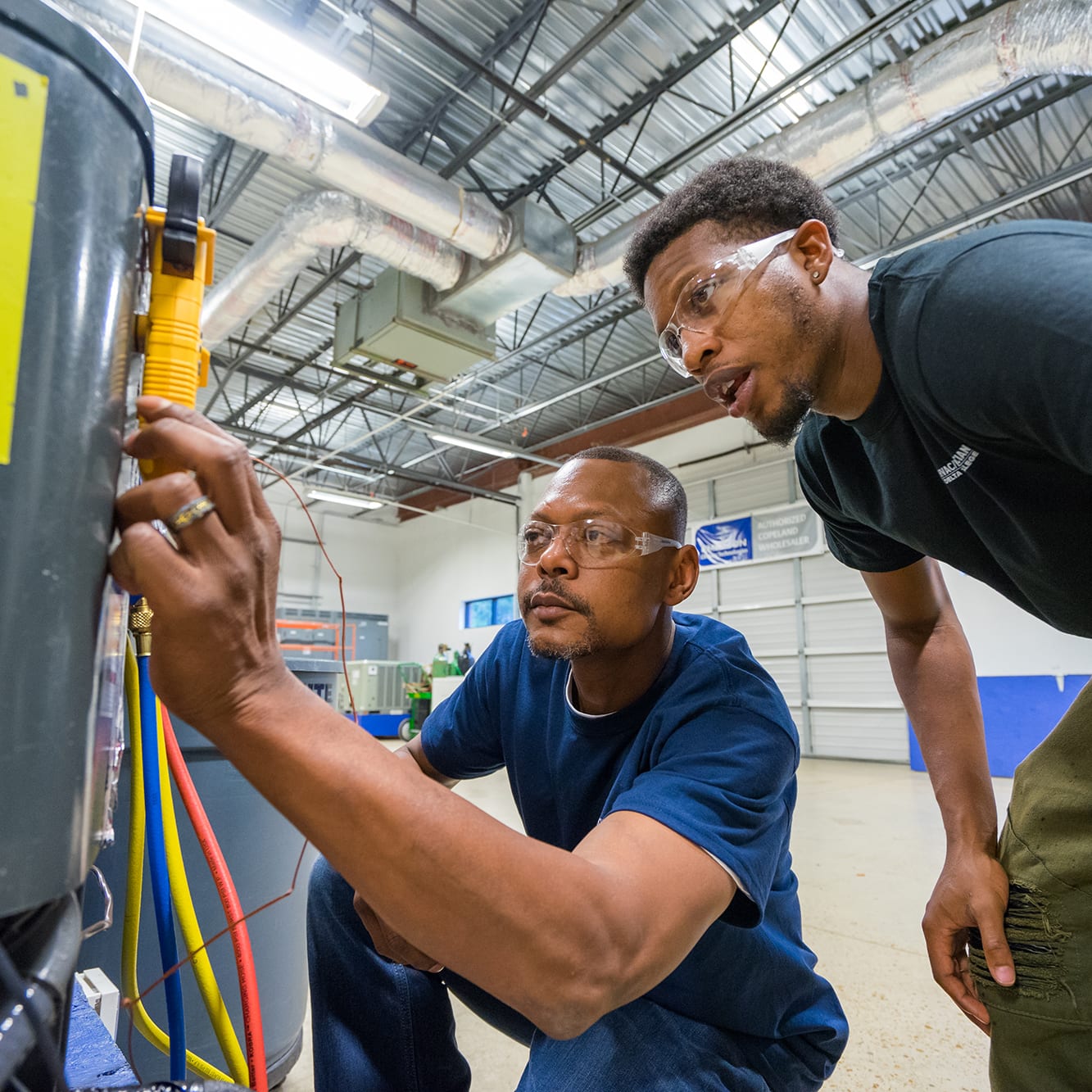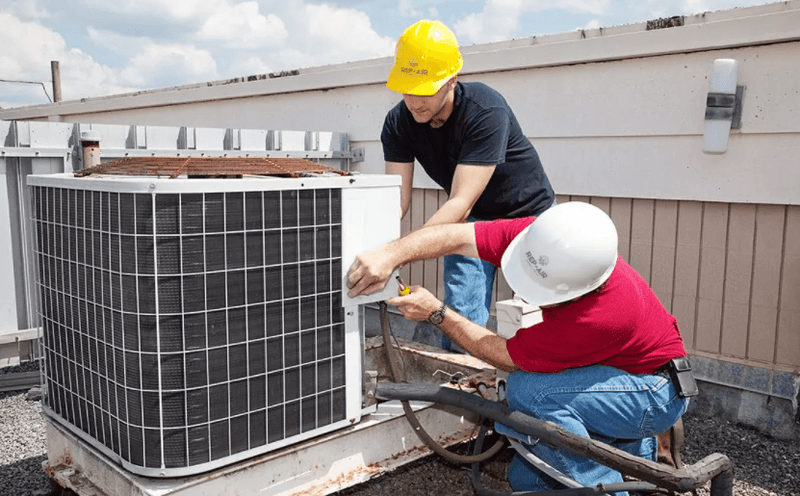Discover how HVAC experts support residential facility comfort needs
Wiki Article
Checking Out the Crucial Elements of a Reliable A/c System
A reliable HVAC system is improved several vital parts that operate in consistency. Each part, from the thermostat to the ductwork, plays a vital function in keeping comfort and energy effectiveness. Recognizing these aspects is important for enhancing efficiency and improving indoor air quality. As one analyzes these parts, the elaborate connections between them expose insights into improving total system effectiveness. What specific factors add most to this effectiveness?The Duty of the Thermostat in A/c Efficiency

Although usually overlooked, the thermostat plays a crucial function in the performance of heating and cooling systems. HVAC experts. This small tool acts as the main nerve center, controling temperature level setups and making certain suitable convenience within a space. By precisely picking up the ambient temperature level, the thermostat connects with the home heating, air, and air flow conditioning units to preserve the preferred climate
A reliable thermostat minimizes energy intake by activating the cooling and heating system just when required, thus stopping too much heating or air conditioning. Modern programmable and smart thermostats enhance this performance additionally by allowing users to set schedules and remotely change settings, adapting to daily routines.
Furthermore, the positioning of the thermostat is important; incorrect location can lead to imprecise temperature level analyses, leading to inefficient procedure. Overall, a well-functioning thermostat not just enhances convenience yet also adds noticeably to power savings and the durability of the heating and cooling system.
Recognizing the Relevance of Air Filters
Air filters serve a crucial feature in cooling and heating systems by ensuring that the air flowing within a space remains tidy and healthy and balanced. These filters catch dust, irritants, and various other contaminants, preventing them from being recirculated throughout the environment. By catching these particles, air filters add to boosted interior air high quality, which can greatly benefit occupants' health, especially those with allergic reactions or breathing problems.In addition, keeping clean air filters improves the efficiency of HVAC systems. Clogged up filters can limit air flow, causing the system to function more challenging to maintain preferred temperature levels, leading to enhanced energy consumption and higher utility bills. Regularly replacing or cleaning filters is a crucial upkeep step that can prolong the life-span of HVAC devices. Ultimately, understanding the importance of air filters enables homeowners and structure supervisors to take proactive procedures to guarantee a well-functioning, reliable cooling and heating system that promotes a safe and comfy indoor atmosphere.

The Functionality of the Heater and Warm Pump
Heaters and heatpump are crucial parts of HVAC systems, accountable for offering warmth throughout cooler months. Furnaces run by heating air with burning or electric resistance, after that dispersing it throughout the home by means of ducts. They normally provide fast home heating and can be sustained by natural gas, electrical energy, or oil, depending upon the system kind.On the other hand, warm pumps transfer warm instead of generate it. They remove warmth from the outside air or ground, even in low temperatures, and move it inside. HVAC experts. This double performance permits heatpump to also provide air conditioning in warmer months, making them flexible alternatives for year-round climate control
Both systems need proper maintenance to ensure performance and long life. While heating systems master extreme cool, heatpump can be helpful in moderate climates. Recognizing their distinctive functionalities help home owners in picking one of the most appropriate option for their home heating needs.
Discovering the A/c Device
The air conditioning unit is a vital component of heating and cooling systems, offered in different kinds to match different needs. Recognizing the efficiency ratings of these systems is crucial for making notified selections concerning power consumption and cost. This area will certainly explore the varied sorts of a/c and clarify exactly how efficiency ratings impact performance.Sorts Of Air Conditioners
While various elements influence the option of cooling systems, understanding the different types offered is essential for homeowners and building managers alike. Central air conditioners are designed to cool down whole homes or buildings, using a network of ducts for air click to find out more movement. Home window units provide an even more local option, ideal for single areas or tiny spaces. Portable a/c unit offer flexibility, enabling users to move the unit as required. Ductless mini-split systems are one more choice, integrating the efficiency of main systems with the ease of zoning, as they call for no ductwork. Lastly, geothermal systems harness the planet's temperature level for energy-efficient cooling. Each kind features distinct benefits, making notified options crucial for reliable climate control.
Performance Rankings Discussed
Understanding efficiency rankings is important for picking the ideal air conditioning unit, as these metrics provide understanding into the system's performance and energy consumption. One of the most common ranking for air conditioning unit is the Seasonal Power Effectiveness Proportion (SEER), which determines the cooling outcome during a normal cooling season divided by the complete electric energy input. A higher SEER suggests much better efficiency. Furthermore, the Power Effectiveness Proportion (EER) is used for measuring effectiveness under details conditions. Another essential metric is the Power Celebrity accreditation, which signifies that a system fulfills strict power effectiveness standards. By assessing these ratings, consumers can make informed options that not just maximize comfort however also lower energy prices and environmental influence.The Relevance of Ductwork and Air movement
Effective ductwork layout and airflow administration play crucial roles in the total effectiveness and efficiency of HVAC systems. Proper ductwork warranties that conditioned air is distributed evenly throughout an area, lessening temperature level fluctuations and enhancing comfort. Well-designed ducts lessen resistance to air flow, lowering the work on HVAC equipment and ultimately decreasing energy intake.Airflow administration involves helpful site tactically putting vents and registers to enhance the flow of air. This stops typical concerns such as cold or warm areas, which can take place when air flow is obstructed or inadequately balanced. In addition, the best air duct products and insulation can additionally boost efficiency by lowering heat loss or gain throughout air transportation.
An effective ductwork system not only adds to energy savings but can additionally prolong the life-span of a/c devices by minimizing unnecessary pressure (HVAC experts). Subsequently, comprehending the relevance of ductwork and air movement is essential for achieving peak HVAC system performance
Regular Upkeep Practices to Improve Efficiency
Regular maintenance techniques are vital for guaranteeing peak performance of HVAC systems. These techniques consist of routine inspections, cleansing, and required repair work to keep the system running successfully. Consistently altering air filters is essential, as clogged filters can obstruct airflow and minimize efficiency. Furthermore, professionals must examine and clean evaporator and condenser coils to avoid overheating and energy waste.Yearly professional assessments are additionally advised, as experienced specialists can identify prospective issues before they escalate. Oiling relocating components decreases wear and tear, adding to a much longer lifespan for the system. Moreover, making certain that the thermostat works correctly help in maintaining excellent temperature level control.

Frequently Asked Questions
Just how Frequently Should I Replace My Thermostat?
Thermostats must commonly be changed every 5 to ten years, depending upon usage and innovation developments. Normal checks are advisable to guarantee peak efficiency, especially if experiencing irregular temperature level control or raised power prices.What Size Air Filter Is Ideal for My Heating And Cooling System?
The most effective dimension air filter for a cooling and heating system varies by device style. Generally, it's vital to consult the owner's manual internet or examine the existing filter dimensions to assure peak efficiency and air quality.Can I Install a Heatpump Myself?
Setting up a heat pump independently is possible for proficient people, yet it requires expertise of regional codes and electric systems. Employing an expert is suggested to assure proper installment and perfect system performance.How Do I Know if My Ductwork Is Effective?
To establish ductwork performance, one must inspect for leaks, step airflow at vents, inspect insulation top quality, and review temperature differences in between supply and return air ducts. Expert assessments can provide comprehensive understandings right into total efficiency.What Are Indicators My A/c Needs Immediate Upkeep?
Indications that a heating and cooling system requires instant upkeep include uncommon sounds, inconsistent temperatures, increased power expenses, unpleasant smells, and frequent biking. Dealing with these issues promptly can protect against further damages and assurance top system efficiency.Air filters serve an important feature in Cooling and heating systems by ensuring that the air circulating within an area continues to be healthy and balanced and tidy. Additionally, keeping clean air filters boosts the efficiency of A/c systems. Ductless mini-split systems are another alternative, combining the effectiveness of main systems with the ease of zoning, as they need no ductwork. Understanding efficiency scores is essential for picking the appropriate air conditioning device, as these metrics provide insight right into the system's efficiency and energy intake. The best size air filter for a Cooling and heating system differs by system layout.
Report this wiki page